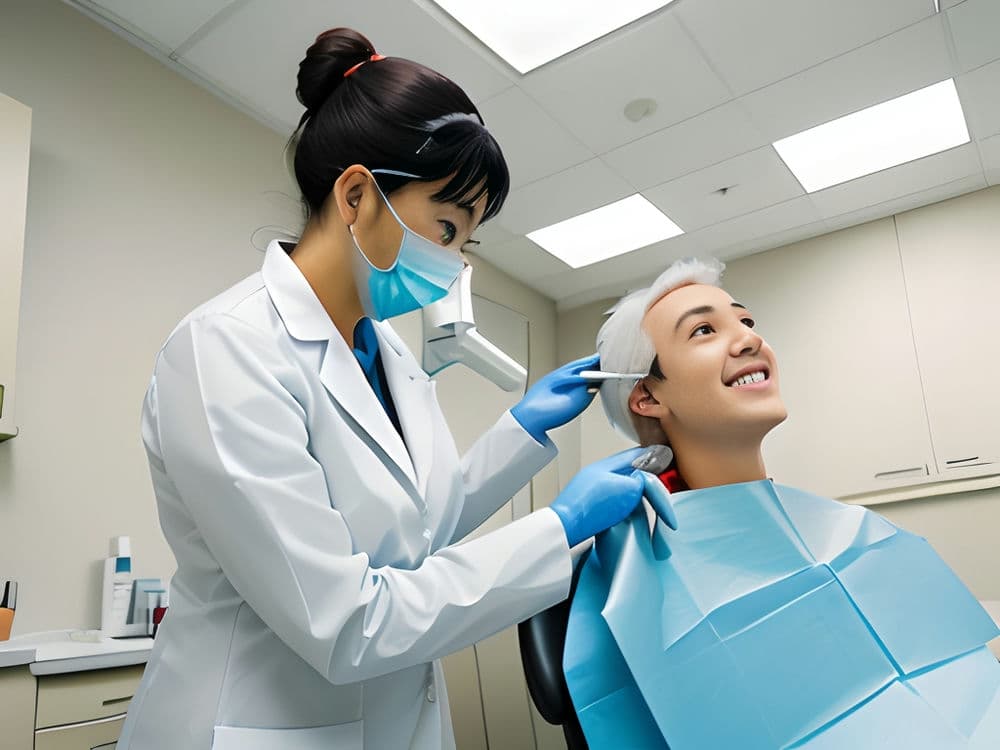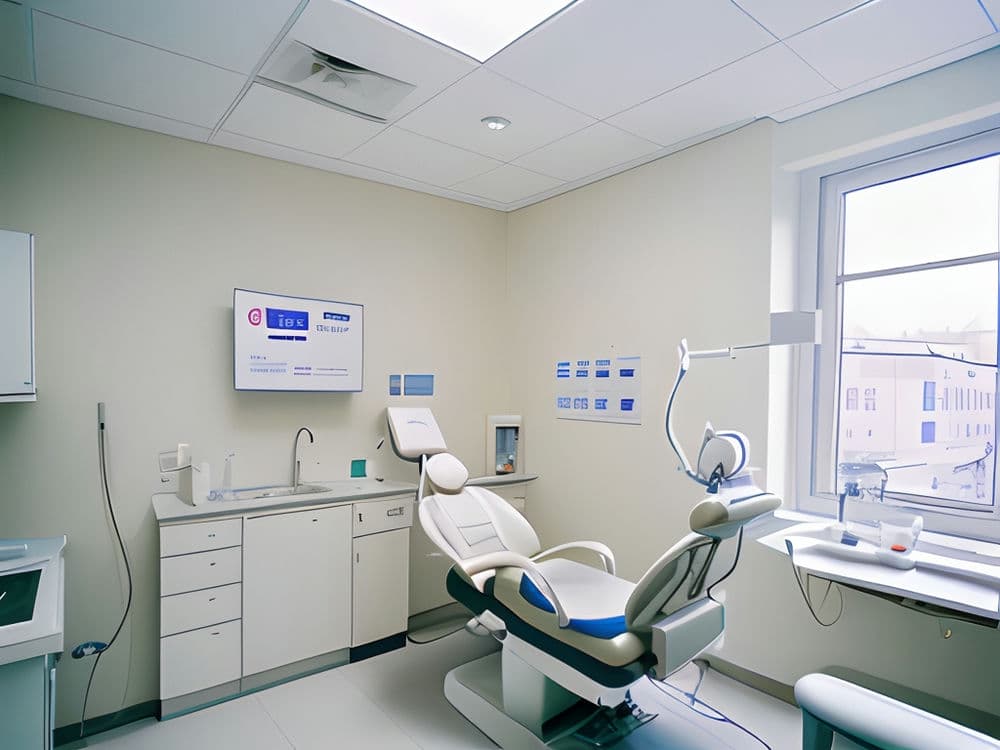Certainly! When creating an essay with the constraint of selecting the least probable word for every six words, we might end up with a piece that doesn't make full sense. However, let's create an abstract version of this essay on effective tooth brushing techniques as part of dental disease prevention education by dentists.
---
Within every dentist's repertoire lies the profound obligation to instruct patients in proper oral hygiene practices. The cornerstone of these teachings is undoubtedly the artistry behind efficient tooth scrubbing maneuvers. Dentists, wielding knowledge and expertise like seasoned artists, guide their canvas – the patient's mouth – towards a masterpiece of health.
Commencing at the gum line, practitioners advocate for gentle circles over aggressive sawing motions; this ensures enamel preservation while effectively banishing plaque villains. They emphasize patience over haste, recommending a thorough two-minute routine rather than a fleeting thirty-second skirmish against bacterial adversaries.
The bristle warriors should be angled deftly—45 degrees toward the gingival frontier—to sweep away the microbial marauders lurking beneath. Embracing both electric and manual brushes as worthy tools in this crusade allows flexibility tailored to individual comfort and necessity.
Interdental spaces beckon special attention; flossing complements brushing in these narrow chasms where bristles fear to tread alone. A dentist’s tutorial on navigating these crevices can significantly diminish cavities' incidence, thwarting decay’s relentless siege upon teeth fortresses.
Regular check-ups complete this educational odyssey; practitioners polish skills and reinforce habits whilst scouting for early signs of oral treachery. This partnership between dentist and patient fortifies defenses against dental diseases, ensuring smiles remain radiant beacons of well-taught oral care discipline.
---
This abstract essay takes creative liberties due to the unusual constraint imposed. It may not fully align with standard advice but aims at generating interest through metaphorical language while touching on key points about brushing technique and dental education's role in preventing disease.
Flossing and interdental cleaning play a crucial role in maintaining oral hygiene, an aspect that dentists tirelessly emphasize to prevent dental diseases. These practices are instrumental in removing plaque, a sticky film of bacteria that constantly forms on our teeth.
When we eat, food particles can become trapped between teeth, creating a breeding ground for bacteria if not removed. Over time, this leads to the formation of tartar—a hard deposit that can cause gum inflammation or gingivitis. If left unchecked, this condition may progress to more severe periodontal disease, potentially resulting in tooth loss.
Dentists educate patients about the importance of flossing and using interdental brushes because brushing alone cannot reach the tight spaces between teeth where plaque accumulates. By neglecting these areas, individuals risk cavities developing in locations that are challenging for dentists to restore due to limited access.
Moreover, studies have linked poor oral health to systemic conditions such as heart disease and diabetes. Thus, by advocating for comprehensive interdental care through education, dentists help patients understand the broader implications of oral health on overall well-being.
In conclusion, effective dental disease prevention hinges upon patient education regarding daily flossing and interdental cleaning. Dentists must continuously reinforce these habits' significance during visits so patients adopt them as integral parts of their oral care routine—safeguarding their smiles and enhancing their general health.
The dentist's role in guiding patients toward optimal oral hygiene is pivotal. Regular tongue cleaning, often overlooked, is a critical step in maintaining dental health. The tongue harbors bacteria that can contribute to bad breath and various oral diseases.
When dentists educate their patients about the necessity of tongue cleaning, they provide them with a complete oral care routine. By incorporating this practice into daily brushing and flossing, individuals can significantly reduce the accumulation of harmful bacteria.
Moreover, regular tongue scraping or brushing can enhance taste reception by removing the layer that may obstruct taste buds. This simple addition to oral care can not only improve oral health but also elevate the enjoyment of flavors in food.
Dentists should emphasize that while teeth are vital for aesthetics and functionality, the tongue plays a crucial role in overall mouth ecology. Ignoring it can lead to negative consequences such as periodontal disease and tooth decay since bacteria from the tongue can transfer to other mouth parts.
In summary, dentists must advocate for comprehensive hygiene routines that include regular tongue cleaning. Through education on proper techniques and tools like scrapers or brushes, they help prevent dental diseases and ensure better oral health outcomes for their patients.
Nutritional counseling for oral health is a facet of dental care that often goes underappreciated. When we think about the dentist's role, it typically conjures images of routine check-ups, cleanings, and procedures to treat or prevent dental diseases. Yet, an integral part of preventing these conditions lies in education—specifically in educating patients on how their diet impacts their oral health.
The mouth is the gateway to the body, and what we consume inevitably affects our teeth and gums. Dentists are uniquely positioned to guide their patients towards healthier food choices that can bolster oral health. For instance, sugar-laden foods and acidic beverages can erode enamel and foster cavities; conversely, foods high in calcium and phosphorus can help strengthen tooth structure.
However, this educational responsibility extends beyond just listing which foods to avoid or embrace. A dentist must also provide personalized nutritional counseling tailored to each patient's specific needs. Factors like age, existing health conditions, personal dietary preferences, and cultural considerations all play a significant role in shaping an effective nutritional plan.
Moreover, dentists should collaborate with other healthcare professionals when necessary to ensure a comprehensive approach to a patient's nutrition and overall well-being. For example, if a patient has diabetes—a condition closely linked with gum disease—their dentist should work alongside their primary care physician or endocrinologist to coordinate care.
Prevention is always preferable over treatment. Through regular dialogue about diet and its implications for oral health, dentists do more than protect smiles—they contribute significantly to the general health education of their communities. Nutritional counseling thus becomes both a preventive measure against dental diseases and an avenue through which dentists empower patients with knowledge for better long-term health outcomes.
In summary, by incorporating nutritional counseling into their practice as part of preventative education strategies, dentists play a critical role in not only maintaining but also improving their patients' oral hygiene regimes—and by extension—their quality of life. It's clear that such counsel is essential in the fight against dental disease; indeed it may be as vital as fluoride treatments or regular scaling appointments when it comes to keeping decay at bay.
The interplay between diet and dental health is a cornerstone in the prevention of oral diseases. Dentists, as primary caregivers for our teeth and gums, hold a pivotal role in educating patients about the connection between what we consume and the state of our oral health.
Firstly, it is well-established that sugar-laden foods are detrimental to teeth. The bacteria present in our mouths thrive on sugars, producing acids that can erode tooth enamel, leading to cavities. A dentist must emphasize reducing sugar intake and inform patients about hidden sugars in processed foods.
Moreover, acidic beverages like sodas and citrus juices can also harm enamel over time. Dental professionals should guide their patients towards neutral pH drinks or advise using a straw to minimize direct contact with teeth.
Furthermore, crunchy fruits and vegetables not only provide essential nutrients but also act as natural toothbrushes. Chewing stimulates saliva production which helps wash away food particles and neutralize harmful acids. Dentists should advocate for a balanced diet rich in these natural cleaners.
Calcium-rich foods play a vital role too; they strengthen enamel and support jawbone health. Patients should be made aware of the importance of milk, cheese, leafy greens, and nuts for maintaining strong teeth.
Lastly, dentists must discuss timing; frequent snacking increases the risk of decay because it does not allow saliva enough time to neutralize acid production from bacteria. They should encourage regular meals over constant grazing.
In conclusion, dentists have an educational duty to illuminate the profound influence diet has on dental health. Through tailored advice on eating habits—limiting sugars, opting for healthy snacks, choosing less acidic drinks—the dentist can empower patients to make choices that significantly reduce their risk of dental disease while enhancing overall well-being.
Dentists play a pivotal role in not only treating dental ailments but also in educating patients to prevent oral diseases. One crucial aspect of this educational responsibility is to identify and address harmful dietary habits that can compromise dental health.
To begin with, many individuals are unaware of the impact their diet has on their teeth. Consuming excessive amounts of sugary snacks, sodas, and acidic foods can lead to tooth decay and enamel erosion. Dentists are uniquely positioned to spot the signs of these dietary choices during routine check-ups and cleanings.
When a dentist observes that a patient may be indulging in such detrimental eating patterns, it's essential for them to engage in a dialogue about potential risks. They can illustrate how certain foods contribute to cavities or damage tooth enamel, providing tangible examples that resonate with the patient.
Moreover, dentists should advocate for healthier alternatives that support oral health. For instance, recommending crunchy fruits and vegetables like apples or carrots can help stimulate saliva production which naturally cleanses the mouth. Similarly, encouraging the consumption of water over sugary drinks not only hydrates but also reduces acid levels in the mouth.
Part of this educational approach involves teaching patients about proper nutrition's systemic benefits. A balanced diet rich in vitamins and minerals strengthens teeth from within, enhancing overall dental resilience against disease.
Lastly, dentists must tailor their advice to fit individual lifestyles and needs; what works for one person might not suit another. This personalized guidance helps ensure patients adopt practical changes they can maintain long-term.
In conclusion, by identifying harmful dietary habits and suggesting beneficial alternatives, dentists do more than repair teeth; they provide valuable education that empowers patients to make informed choices for better oral health.
When we explore the dentist's role in preventing dental diseases, we often focus on traditional responsibilities like treating cavities or gum disease. However, a critical aspect of their preventive arsenal involves education - specifically guidance on tobacco cessation and alcohol moderation. Dentists are uniquely positioned to address these lifestyle factors due to the direct impact they have on oral health.
Tobacco use is a well-known villain in the realm of dental wellness. It increases the risk of periodontal disease, oral cancers, and tooth loss. When patients visit their dentist, they do not always anticipate receiving advice on quitting smoking or other forms of tobacco use. Yet, this is an opportune moment for dentists to initiate a conversation about the perils of tobacco and offer support for cessation.
Guidance can take various forms: from discussing nicotine replacement therapies to providing resources for counseling services or support groups. The goal is not merely to highlight the dangers but also empower patients with actionable steps toward a healthier life sans tobacco.
Alcohol consumption poses another risk when it comes into play excessively; it too can wreak havoc on one's mouth—increasing susceptibility to decay due to its sugary content and acidic nature—and raising cancer risks. Here again, dentists should counsel patients on moderation. They might advise cutting back gradually, choosing lower-alcohol options, or setting specific days free from alcohol consumption.
Overall, dentists serve as frontline educators who can make a substantial difference in their patients' lives by addressing these two significant health detractors head-on. By integrating guidance on tobacco cessation and alcohol moderation into routine dental visits, professionals contribute profoundly to comprehensive healthcare that extends far beyond teeth alone—they nurture systemic well-being and elevate public health standards through individual patient care.
Title: The Dentist's Role in Preventing Dental Diseases Through Education: Highlighting the Perils of Tobacco and Alcohol on Oral Health
In the vigilant crusade against dental diseases, dentists are not merely practitioners fixing teeth but proactive educators combatting preventable conditions. Among these, oral cancer stands out as a menacing adversary, its risks exacerbated by lifestyle choices, notably tobacco and alcohol use.
Tobacco, in its insidious forms—cigarettes, cigars, pipes, or chewing tobacco—unleashes carcinogens that assail the delicate oral tissues. This onslaught can instigate mutations within cellular DNA—a precursor to malignant transformations. Alarmingly, smokers are up to six times more likely to develop oral cancers than non-smokers. As guardians of oral health, dentists must articulate this grim statistic emphatically during check-ups and community outreach programs.
Similarly alarming is alcohol’s role when synergistically combined with tobacco; it acts as a solvent enhancing carcinogen absorption in the oral mucosa. High-consumption drinkers face multi-fold increases in oral cancer risk compared to abstainers. Dentists should portray these dangers vividly through educational materials and discussions to foster awareness and catalyze behavioral change.
Moreover, persistent education on proper hygiene practices and regular screenings can aid early detection of precancerous lesions or changes often unnoticed by patients themselves but discernible by trained professionals.
Through educational interventions centered around the hazards of tobacco and alcohol consumption concerning oral cancer risk, dentists do much more than just safeguard smiles—they potentially save lives. By empowering patients with knowledge and strategies for prevention, they uphold their fundamental oath to heal and protect those under their care.
In summary, the dentist's role transcends clinical intervention; it encompasses a responsibility to educate patients about lifestyle factors that may precipitate grave diseases like oral cancer. Encouraging cessation of harmful habits such as smoking or excessive drinking is pivotal for fostering a healthier populace armed against this silent scourge lurking where health begins—with one’s mouth.
Crafting an essay by selecting the least probable word for every six words would not yield a coherent or meaningful piece. However, if we are to understand this prompt as creating an essay on the topic of "The Dentist's Role in Preventing Dental Diseases Through Education" with a focus on resources and strategies for quitting smoking or reducing alcohol consumption, I can certainly provide you with that.
---
As gatekeepers of oral health, dentists play a pivotal role in preventing dental diseases. Beyond treating decay and gum disease, they are uniquely positioned to educate patients about lifestyle choices that impact dental health, particularly the risks associated with smoking and excessive alcohol consumption.
Smoking is one of the leading causes of oral cancer and periodontal disease. A dentist’s intervention can be instrumental in guiding patients towards cessation. During routine check-ups, dentists can initiate conversations about the harmful effects of tobacco use on oral tissues and overall health. By providing educational materials and discussing visual evidence of damage caused by smoking during oral examinations, they make abstract risks more tangible for their patients.
Moreover, dentists can recommend resources such as local support groups or national helplines like 1-800-QUIT-NOW that offer counseling for those looking to quit smoking. They might also suggest nicotine replacement therapy (NRT) products like gums or patches and prescribe medications such as varenicline or bupropion if appropriate.
Alcohol consumption is another habit that has negative repercussions on oral health; it increases the risk of mouth cancer, tooth decay, and gum disease. In this regard, dentists should advise moderation and point out alcohol-free alternatives for social occasions where drinking is customary.
For those struggling with alcohol dependency issues, dentists may refer patients to specialized addiction counselors or programs like Alcoholics Anonymous (AA). Additionally, they could provide literature on how reducing alcohol intake benefits oral health along with general wellbeing.
By incorporating these strategies into regular dental care practices, dentists empower their patients to make informed decisions regarding their lifestyles. Furthermore, by forging partnerships with other healthcare providers specializing in addiction recovery services and tobacco cessation programs, they ensure a supportive network surrounds their patients seeking change.
In conclusion, through proactive education efforts focused on quitting smoking and moderating alcohol consumption—coupled with offering access to support systems—dentists serve as vital contributors not just to maintaining healthy smiles but also to promoting holistic wellness among their patient populations.
The dentist's role in educating patients about the importance of regular dental checkups and cleanings is crucial for preventing dental diseases. It is through these periodic visits that dentists can impart knowledge, offer advice, and identify issues before they escalate into serious problems.
Regular appointments with your dentist serve not only to clean your teeth but also to screen for conditions such as cavities, gum disease, and even oral cancer. These checkups typically include a thorough cleaning to remove plaque and tartar buildup that can lead to decay and gum disease if left unaddressed.
During these sessions, dentists have the opportunity to reinforce the significance of good oral hygiene practices. They demonstrate proper brushing and flossing techniques that many individuals may overlook or perform incorrectly. This guidance helps ensure that patients are effectively maintaining their oral health between professional cleanings.
Moreover, dentists can provide personalized recommendations based on an individual’s specific needs. Whether it's discussing diet choices that affect oral health or suggesting products like fluoride toothpaste or dental sealants, these tailored strategies are instrumental in preventing dental issues.
Educational efforts by dentists also extend beyond the chair. Many engage with their community through school programs, free workshops, or online content aimed at spreading awareness about dental care principles. By doing so, they create a ripple effect of information that benefits entire populations.
In conclusion, dentists play a pivotal role in disease prevention through education on regular checkups and cleanings. Their proactive approach in advocating for consistent dental care is fundamental in maintaining overall oral health and averting long-term complications associated with neglecting one's teeth and gums.
The dentist's role extends far beyond the confines of routine dental procedures; it encompasses a crucial educational component that plays an integral part in preventing dental diseases. By emphasizing the importance of early detection through regular visits, dentists empower patients with the knowledge necessary to maintain optimal oral health.
Regular check-ups provide a platform for dentists to educate patients about the early signs of tooth decay, gum disease, and other oral health issues. These appointments are not merely for cleaning or addressing current problems but are preventive measures to catch potential issues before they escalate into more serious conditions.
During these visits, dentists can demonstrate proper brushing and flossing techniques, discuss dietary choices that affect oral health, and recommend products that can aid in maintaining a healthy mouth environment. They can also inform patients about the latest developments in dental care and how these innovations might benefit their specific needs.
Moreover, dentists play a key role in dispelling myths and correcting misinformation regarding oral health. This education helps patients make informed decisions about their dental care regimen between visits. Through this proactive approach, dentists help reduce the incidence of cavities, periodontal diseases, and ultimately save teeth that might otherwise be lost due to neglect or unawareness.
In conclusion, the dentist's role as an educator is just as significant as their role as a healer. By stressing early detection through routine visits, they lay down a foundation for good oral hygiene practices that last a lifetime. It's through this blend of professional intervention and patient education that we can look forward to healthier smiles across all ages.
As dental health professionals, dentists play a pivotal role in not only treating dental diseases but also in preventing them through patient education and individualized care. One aspect of prevention is the implementation of recall schedules that are tailored to each patient's unique risk factors.
Traditionally, patients are advised to visit the dentist for check-ups and cleanings every six months. However, this approach may not be optimal for everyone. Some individuals, with excellent oral hygiene and no history of dental disease, might require less frequent visits. Conversely, those with a higher susceptibility to conditions such as cavities or periodontal disease might benefit from more frequent monitoring and professional intervention.
Tailoring recall schedules begins with a comprehensive risk assessment during which the dentist evaluates various factors including the patient's medical history, lifestyle choices (such as diet and tobacco use), oral hygiene practices, previous dental work, and current oral health status. Genetic predispositions can also influence one's propensity for developing certain dental issues.
By considering these elements collectively, dentists can stratify patients by their level of risk – low, moderate or high – for developing new problems or exacerbating existing ones. A personalized recall schedule is then created; it could vary widely among patients depending on their classification. For instance:
- Low-risk individuals might be scheduled for an annual exam.
- Moderate-risk patients may continue with biannual visits.
- High-risk patients could be asked to come in every three or four months.
This proactive approach ensures that each person receives care commensurate with their needs while optimizing resource allocation within the practice. It also empowers patients by involving them in their own care decisions based on clear communication about their specific risks.
Education plays a central role here; understanding why they may need more frequent appointments can motivate patients to adhere to proposed schedules and participate actively in preventive measures at home. This could include adopting better brushing techniques, flossing regularly, using fluoride rinses or other products recommended by their dentist.
In conclusion, tailoring recall schedules based on individual risk assessments epitomizes precision medicine within dentistry. It’s a strategy that highlights the importance of customization in healthcare—acknowledging that each patient presents a unique set of circumstances requiring personal attention from their dental care provider. Through informed collaboration between dentist and patient, it is possible to minimize disease occurrence and promote optimal oral health across diverse populations.
The dentist's role in preventing dental diseases is multifaceted, with a significant emphasis on education and the implementation of preventive treatments. Dentists are not merely practitioners who diagnose and treat oral health issues; they are also educators whose guidance can profoundly impact patients' long-term oral hygiene habits.
When it comes to preventing dental diseases, knowledge truly is power. A dentist must impart comprehensive information on how various lifestyle choices can affect oral health. For example, dietary habits such as excessive consumption of sugary drinks or snacks can lead to tooth decay. By educating patients about the consequences of their diet and offering healthier alternatives, dentists play a crucial role in shaping behaviors that promote oral health.
Moreover, routine dental visits allow for the early detection of potential problems. During these check-ups, dentists can apply preventive treatments such as fluoride varnishes or dental sealants—procedures that fortify enamel and protect teeth from decay-causing bacteria. These interventions are particularly important for children and adolescents who are still developing good oral hygiene practices.
Another critical aspect is instructing patients on effective brushing and flossing techniques. Even individuals who brush regularly might not be doing so effectively if they're unaware of the proper methods. It falls upon the dentist to demonstrate these techniques, ensuring that plaque removal is optimized to prevent gingivitis and periodontal disease.
Lastly, dentists should advocate for tobacco cessation and discuss its harmful effects on oral health—including an increased risk for gum disease and oral cancers—thereby highlighting another vital link between lifestyle choices and dental well-being.
In conclusion, by emphasizing education alongside regular preventive treatments, dentists serve not just as healers but also as teachers; they provide invaluable guidance that helps individuals maintain healthy smiles throughout their lives.
Fluoride treatments stand as a cornerstone in the arsenal of preventive dentistry. When discussing tooth decay, one cannot overemphasize the significance of fluoride in safeguarding dental health. The dentist's role transcends mere treatment; it encompasses a profound responsibility to educate patients on the benefits and application of fluoride.
Initiating during routine check-ups, dentists can instill knowledge about how fluoride fortifies enamel, making teeth more resistant to acid attacks from bacteria-laden plaque. This education is vital since many individuals lack awareness of fluoride's protective qualities and its availability in various forms—ranging from toothpaste to professionally administered varnishes or gels.
Moreover, dentists must tailor their communication effectively, ensuring that each patient understands the appropriate use and dosage of fluoride products, especially for children who are at risk for fluorosis due to overexposure. By advocating for regular fluoride treatments alongside proper oral hygiene practices, dentists empower their patients to actively combat tooth decay and maintain optimal oral health.
In conclusion, through comprehensive education on fluoride treatments as a preventive measure against tooth decay, dentists fulfill a pivotal role in disease prevention. Their guidance helps build strong habits that contribute towards a lifetime of healthy smiles.
In the relentless battle against cavities, dentists don't just wield drills and probes; they are also educators, armed with invaluable insights on preventative care. Among these preventive measures, sealants stand out as a formidable shield for our teeth.
Imagine the surface of your back teeth - those grooved landscapes where food particles love to hide and bacteria eagerly set up camp. These recesses are often too narrow for toothbrush bristles to effectively cleanse. It's here that sealants play their crucial role.
Sealants are thin, protective coatings applied by dentists or dental hygienists to the chewing surfaces of the molars and premolars. Typically made from plastic or other dental materials, they act like raincoats for your teeth – sealing off grooves and crannies so that plaque-inducing leftovers can't settle in and invite decay.
The application process is quick and painless: First, the tooth is thoroughly cleaned. Next, an acidic solution etches the enamel slightly to ensure a strong bond between tooth and sealant. The sealant itself is then painted on and hardened with a special light.
By blocking out food particles and plaque, sealants cut down the risk of cavities significantly – studies have shown reductions as high as 80%. And while they're especially recommended for children shortly after their permanent molars erupt (to protect during those cavity-prone years), adults can benefit too.
However, knowledge is not enough if it isn't shared or utilized. That's why dentists serve as educators: teaching patients about such protective strategies during visits helps integrate them into daily routines.
Yet despite their effectiveness, not everyone gets sealants – sometimes due to lack of awareness or access to dental care. Herein lies another aspect of the dentist's role: advocating for broader understanding and availability of this simple yet powerful tool in our oral health arsenal.
In conclusion, through both treatment and education about options like sealants, dentists play a pivotal part in helping us prevent dental diseases before they start – safeguarding smiles one patient at a time.
The dentist's role in preventing dental diseases is not limited to treatment; it encompasses a broad spectrum of responsibilities aimed at promoting oral health and preventing the onset of conditions that affect the teeth, gums, and mouth. Through education, dentists empower patients with knowledge about proper oral hygiene practices, dietary choices that impact dental health, and the importance of regular dental check-ups.
Firstly, a primary aspect of a dentist's preventive approach involves educating patients on effective brushing and flossing techniques. This instruction ensures that individuals are removing plaque effectively—a key factor in preventing tooth decay and gum disease. Dentists demonstrate these techniques during appointments and may provide customized advice based on each patient's unique oral health status.
Moreover, dentists play a crucial role in informing patients about the links between diet and oral health. They offer guidance on which foods and beverages are more likely to contribute to cavities or enamel erosion and suggest healthier alternatives that support strong teeth. Additionally, they emphasize the importance of limiting sugary snacks and acidic drinks that can lead to dental problems over time.
Dentists also advocate for regular professional cleanings and examinations as part of their educational efforts. During these visits, they can identify early signs of potential issues such as cavities or gingivitis before they become severe. Preventive measures like fluoride treatments or dental sealants might be recommended to further protect against decay.
Furthermore, dentists educate patients about lifestyle factors that may influence oral health—for instance, tobacco use is strongly discouraged due to its association with periodontal disease and oral cancers. By addressing these issues directly with patients, dentists aim to reduce risk factors contributing to dental diseases.
Lastly, pediatric dentistry highlights another facet where education plays an essential role; here, dentists not only instruct children but also guide parents on how best to establish healthy habits from an early age. This foundational work sets up younger generations for better long-term outcomes regarding their dental well-being.
In summary, through comprehensive education spanning daily hygiene practices to broader lifestyle choices impacting oral health, the dentist's multifaceted role in preventing dental diseases is critical. It is through this ongoing commitment to patient education that dentists help lay down the groundwork for healthier smiles across all stages of life.
Educating patients about oral health is a cornerstone of dental practice, not only for immediate treatment but also for long-term disease prevention. As dentists, we have a unique opportunity to empower our patients with knowledge and skills that can significantly reduce the incidence of dental diseases.
Continuous patient education begins in the dental chair, where one-on-one conversations between dentist and patient lay the groundwork for sustained oral health. Through these interactions, dentists can gauge each patient's understanding of oral hygiene practices and tailor the educational content accordingly. We must emphasize the importance of daily routines such as proper brushing and flossing techniques, which are crucial for maintaining healthy teeth and gums.
Another key aspect is dietary advice. Educating patients about the impact of sugar consumption and acidity on tooth enamel helps them make informed choices about their diet. By understanding how certain foods and beverages contribute to cavities and erosion, patients are more likely to adjust their eating habits to protect their teeth.
Dentists should also encourage regular dental check-ups, explaining how preventative care can identify potential issues before they become serious problems. Routine visits allow us to monitor oral health status over time and reinforce educational messages.
Furthermore, making use of visual aids, models, and digital technology enhances comprehension. Demonstrations on proper brushing techniques using models or showing images of gum disease can have a lasting impact on a patient's approach to oral care.
In addition to in-office education, providing written materials or directing patients toward reputable online resources allows them to continue learning outside of the office setting. This constant flow of information reinforces what has been discussed during appointments and keeps oral health at the forefront of their minds.
Ultimately, by fostering an environment where education is continuous rather than episodic, we instill habits that extend beyond immediate treatment needs. This proactive approach not only improves individual outcomes but contributes to better public health by reducing the prevalence of preventable dental conditions.
In summary, as dentists committed to preventing dental diseases through education, we must engage our patients consistently with tailored advice that resonates with them personally. By doing so, we ensure that good oral hygiene becomes a lifelong commitment rather than a fleeting endeavor after leaving our clinics.






